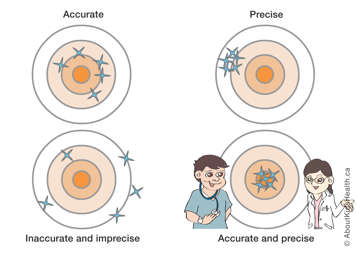When talking about hemophilia to your friends or people you are dating, it is always important to make sure you seek good quality information. In addition to talking to others, you may find information in magazines, books or on the Internet. Regardless of the source of information, it is up to you to decide if that information is credible. Make sure you use your discretion when researching or when hearing people’s opinions on matters.
Good information is both accurate and precise
Playing darts is a good way to illustrate the difference between precision and accuracy. When you are playing darts, the closer to the centre you are the more points you get. Hitting the center is an accurate shot; hitting the dart board consistently but in the wrong spot, is precise, but inaccurate. The best dart players are both precise and accurate: they consistently hit the bulls’ eye.
This is a helpful way to think of the information we get from all the people in our lives. Similarly, credible information is both precise and accurate. You can trust information from health-care professionals because there is an overall consensus in the medical community about the findings, based on research and evidence from peer-reviewed journals. Perhaps even more important, your comprehensive care team (CCT) can let you know what isn’t known or clear yet about a particular topic.

Using the Internet for information
In the past, you may have used the Internet to find out something about hemophilia. Sometime in the future, you may have a hemophilia-related question and decide to search online. The Internet is a great resource for getting information quickly. As we discussed above, it is important to be able to tell if the information you find is accurate and precise. There are many websites available on the Internet about hemophilia. However, not all these websites will have accurate information. If you are not sure about information you read from a particular website, ask your health-care provider.
How can you find out whether a website is credible?
Use the acronym SCREEN:
| S - Source | Does the website have a credible sponsor? |
| C - Conflict | Is the website promoting a certain product? Does it only present one side of an issue? |
| R - Review process | Did the website undergo an editing process? Does it have a seal of approval? |
| E - Evidence-based | Are scientific claims backed up by scholarly sources? |
| E - Extreme claims | If the website has exaggerated claims, it is likely profit-driven. |
| N - Not-related | If the website has information different from what you have heard from your doctor, it is probably not a reliable source. |
The following websites contain good information on hemophilia: